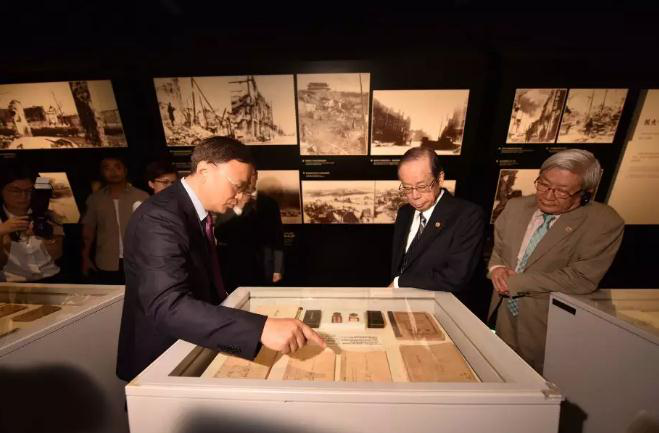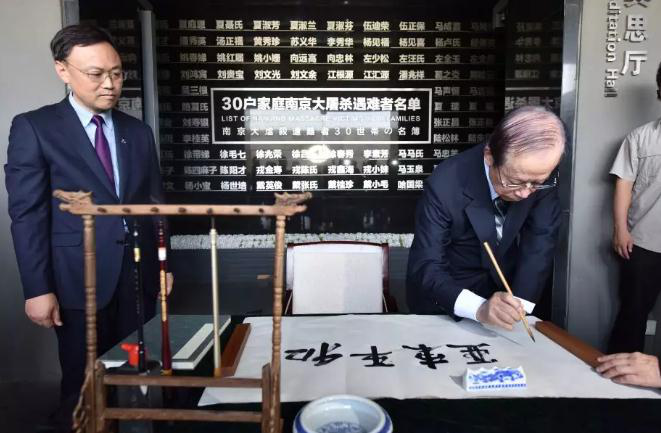Former Japanese Prime Minister Yasuo Fukuda:Respect history as facts are facts

On the afternoon of June 24, Yasuo Fukuda, former Japanese prime minister, who was attending an academic conference in Shanghai, paid a special visit to the Memorial Hall of the Victims in Nanjing Massacre by Japanese Invaders. During visit, he laid a wreath to mourn the victims and wrote an autograph, “Peace in East Asia.” In an interview, he told reporters that “Facts are facts, we should respect history. Both the Japanese and Chinese people should not forget history, and more importantly, work together for a new peaceful and better era in future.”
Yasuo Fukuda and his delegation arrived at the Memorial Hall nearly at 3:00 PM on June 24, nearly one hour ahead of the scheduled time. Zhang Jianjun, curator of the Memorial Hall, served as the docent guide personally. During the nearly two-hour visit, Yasuo Fukuda kept a solemn attitude for watching and listening carefully.

After the visit, Yasuo Fukuda went to the shrine, laying a wreath and writing “I deeply mourn for the victims of the Nanjing Massacre, written by Yasuo Fukuda, former Japanese prime minister” on the white couplet. Afterward, he arranged the couplet with hands gently and led his delegation to stand in silent tribute for a long time. Finally, Yasuo Fukuda walked to the desk in front of the meditation hall, inscribed the words “Peace in East Asia” with brush, and received the history book and peace badge presented by Zhang Jianjun, curator of the Memorial Hall.

Yasuo Fukuda: it is our duty to spread history to next generations
It is learned that Yasuo Fukuda arrived in Shanghai on Tuesday to attend an academic activity marking the 40th anniversary of the China-Japan treaty of peace and friendship at the invitation of the Chinese Academy of Social Sciences, Fudan University, Introduction of Chinese Association for Japanese Studies, etc. When asked why to visit the Memorial Hall of the Victims in Nanjing Massacre by Japanese Invaders in such a special year, Mr. Fukuda told reporters, “I have always felt that I should come here. I have been to Nanjing once before, but the busy schedule makes visit impossible. This time I attend a conference in Shanghai, which is not far from Nanjing, so I must come here!”
About the experience of visit, Yasuo Fukuda said, “The most profound feeling is that we must avoid war and cherish peace to the best of our ability. This visit lets me deeply feel the war is so cruel, causing terrible harm to innocent people. War gives rise to numerous tragedies, and all mankind should strive to avoid war.”
During the visit, Zhang Jianjun gave a detailed introduction of the fall of Nanjing City, the process of the tragic massacre, as well as the efforts made by many Japanese friends to remember the history and realize the reconciliation between the hearts and minds of people in both countries. Fukuda praised the concept of exhibition in the Memorial Hall, saying “It is a very good memorial, where I can feel its great efforts to show the history through detailed historical data. Many data have not even been made public in Japan, which are worthy of attention for Japanese people”.
Zhang Jianjun, curator, expresses that we look forward to welcoming more Japanese politicians to our memorial for learning about the history
Fukuda, 82 years old, born in 1936, was accompanied by many heavyweights, such as Sakutaro Tanino, one of his childhood friends and a former Japanese ambassador to China, Iokibe Makoto, former President of the National Defense Academy and a renowned political scholar. Mr. Fukuda was praised as a man of conscience by Iokibe Makoto in an interview, saying “Mr. Fukuda has said in his many speeches that the tragedy of war must not happen again. It is an indisputable fact that there have been tragedies beyond ordinary acts of war. Mr. Fukuda comes here to lay a wreath, demonstrating he is a man of conscience and worthy of admiration.”
Following Tomiichi Murayama, Toshiki Kaifu and Yukio Hatoyama, Yasuo Fukuda is the fourth former Japanese prime minister to visit the Memorial Hall. Fukuda has spoken highly of today’s Nanjing, saying that some Japanese people are reluctant to come to Nanjing due to historical reasons, but Nanjing is now a booming city. After returning to Japan, I would like to encourage people around me to go to Nanjing to experience this beautiful city.
Fukuda’s visit was scheduled to last for one hour, but he finally stayed in the Memorial Hall for more than 2 hours. Curator Zhang Jianjun said, “Mr. Fukuda maintained a serious attitude and raised deep questions concerning the historical artifacts displayed in the exhibition carefully during his visit. We appreciate that he holds a correct attitude towards that period of history. Also, the Memorial Hall wishes to welcome more Japanese politicians to visit our memorial to learn about the history.”
Lu Kang, spokesperson of the Ministry of Foreign Affairs, expresses that we appreciate the act of facing up to history and calling for peace
At the regular press conference of the Ministry of Foreign Affairs on June 26, a reporter asked that “how does China comment on Yasuo Fukuda, former Japanese prime minister, laying a wreath at the Memorial Hall of the Victims in Nanjing Massacre by Japanese Invaders and expressing his condolences?”
Lu Kang said, “We have noted that Yasuo Fukuda, former Japanese prime minister paid a visit to the Memorial Hall of the Victims in Nanjing Massacre by Japanese Invaders, and laid a wreath to show his condolences. The acts of facing up to history and calling for peace by Japanese people are highly appreciated.”
This year marks the 40th anniversary of the conclusion of the China-Japan treaty of peace and friendship. Japan is expected to earnestly review the spirit of the treaty, truly implement the positive will to improve its relations with China, and work hard with China to consolidate the political foundation of bilateral relations and promote mutual relations to stea?dily move forward on the track of peace, friendship and cooperation.
Edited by CRI Online, China Media Group, and Reported by public account of “Spokesman Office of the Ministry of Foreign Affairs of the People’s Republic of China”

